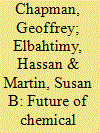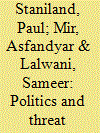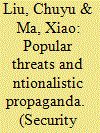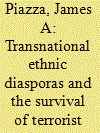|
|
|
Sort Order |
|
|
|
Items / Page
|
|
|
|
|
|
|
| Srl | Item |
| 1 |
ID:
163245


|
|
|
|
|
| Summary/Abstract |
cholars have vigorously debated whether adversaries carefully scrutinize if states have, in the past, demonstrated toughness and whether adversaries base present and future crisis-bargaining behavior on this record. If they do—as a central strain of deterrence theory, and its contemporary defenders, maintain—hard-line policies, including limited military interventions, can bolster deterrence. We know much less about a second audience that is presumably attentive to demonstrations of resolve: allies. A common view, derived from the same logic, and which we call Hawkish Reassurance Theory, suggests that states should support and find reassuring their allies’ faraway military interventions. In contrast, we argue that such interventions call into doubt the intervener’s will and capacity to fulfill its core alliance commitments, undermine the credibility of the alliance, and threaten allies’ security in both the short and long run. Allies thus ultimately oppose powerful partners’ hawkish postures in distant conflicts, and they may even consequently explore routes to security beyond the alliance. To assess this argument, we examine the varied stances leading US allies took from the start of the US intervention in Vietnam through its end. Allied behavior was largely consistent with our expectations. We conclude that, if one reason to deploy force is to signal to allies that you will come to their aid when they call, states should not bother.
|
|
|
|
|
|
|
|
|
|
|
|
|
|
|
|
| 2 |
ID:
163253


|
|
|
|
|
| Summary/Abstract |
With chemical weapons (CW) use in Syria raising questions about the health of the CW norm, this article analyzes whether the Syrian case will lead to further proliferation and use of chemical weapons by states. We examine the use of chemical weapons at Ghouta in 2013 and on the Hama Plains in 2014 and find that: first, chemical weapons have demonstrated limited military utility in Syria, either tactically or as a tool of civilian victimization; second, the costs of use have been repeatedly demonstrated by the international reaction to their use; and third, the use of sarin—a nerve agent—has attracted a stronger international response than the use of chlorine, a less lethal agent. Consequently, we conclude that the Syrian case is unlikely to lead to significant proliferation and use of chemical weapons; any that does occur is most likely to involve states already outside the CW norm.
|
|
|
|
|
|
|
|
|
|
|
|
|
|
|
|
| 3 |
ID:
163251


|
|
|
|
|
| Summary/Abstract |
This article argues that when actors engage in controversial new security practices, it is misconceived to view secrecy as an opposed, counterproductive alternative to the pursuit of legitimation. Rather, we propose, deployment of “quasi-secrecy”—a combination of official secrecy with leaks, selective disclosure, and de facto public awareness—can be an effective strategy for achieving normalization and legitimation while containing the risks entailed by disclosure. We support this claim via a detailed case study of US targeted killing. First, we establish the existence of an American norm against targeted killing during the period 1976–2001. We then detail the process by which an innovation in practice was secretly approved, implemented, became known, and was gradually, partially officially acknowledged. We argue that even if quasi-secrecy was not in this instance a coherently-conceived and deliberately pursued strategy from start to finish, the case provides proof of concept for its potential to be deployed as such.
|
|
|
|
|
|
|
|
|
|
|
|
|
|
|
|
| 4 |
ID:
163243


|
|
|
|
|
| Summary/Abstract |
Analysts and policymakers agree that the Pakistani military has engaged in selective repression of and collusion with armed groups. Yet beyond this general observation, fine-grained theory and evidence do not exist to systematically explain patterns of military strategy across groups and over time. This paper provides a theoretical framework for explaining regime perceptions of armed groups and the strategies state security managers pursue toward different types of groups. It then probes this framework using a combination of new medium-N data on military offensives, peace deals, and state–group alliances in Pakistan’s North West and four comparative case studies from North and South Waziristan. We argue that the Pakistani military—the key state institution in this context—has assigned armed groups to different political roles reflecting both their ideological affinity with the military and the operational benefits they can provide to the army. This mixture of instrumental and ideological motivations has created a complex blend of regime threat perceptions and state–group interactions across space and time. A clearer understanding of how the military views Pakistan’s armed political landscape can inform policy debates about the nature of Pakistani counterinsurgency, as well as broader theoretical debates about order and violence.
|
|
|
|
|
|
|
|
|
|
|
|
|
|
|
|
| 5 |
ID:
163249


|
|
|
|
|
| Summary/Abstract |
Conventional wisdom suggests that authoritarian leaders use nationalist propaganda as a tool to strengthen mass support. Yet few studies have provided systematic evidence to account for specific tactics underlying these information manipulations. We argue that autocrats, recognizing the material costs of propaganda, are more likely to target localities with the greatest antiregime potential. Using a unique dataset of “patriotic education sites” that the Chinese Communist Party assigned throughout China as tools to advance its nationalistic campaign, we found a systematic association between these locations and the scale of antiregime mobilization in the 1989 prodemocracy movement. The longer the antiregime protest lasted in a city in 1989, the greater the number of patriotic education sites the city contains. Our findings highlight the strategic way in which autocrats manipulate nationalist propaganda to mitigate popular threats.
|
|
|
|
|
|
|
|
|
|
|
|
|
|
|
|
| 6 |
ID:
163246


|
|
|
|
|
| Summary/Abstract |
What effects do transnational ethnic diaspora communities have on the terrorist organizations with which they are linked? Are diaspora-linked terrorist movements more resilient and longer lived? What types of diaspora support affect terrorist survival? Finally, do diasporas affect peaceful resolutions of terrorist campaigns? Using data on 586 terrorist movements during the period 1970–2007, this study finds that movements linked to transnational ethnic diasporas are more resilient. They are significantly less likely to end, particularly through counterterrorism force, and this seems to be a product of diaspora provision of material support rather than diaspora political and propaganda efforts. Finally, diasporas seem to have a negative impact on political resolution of terrorist campaigns, as diaspora-linked terrorist movements are also significantly less likely to end by entering into a political process.
|
|
|
|
|
|
|
|
|
|
|
|
|
|
|
|
|
|
|
|
|